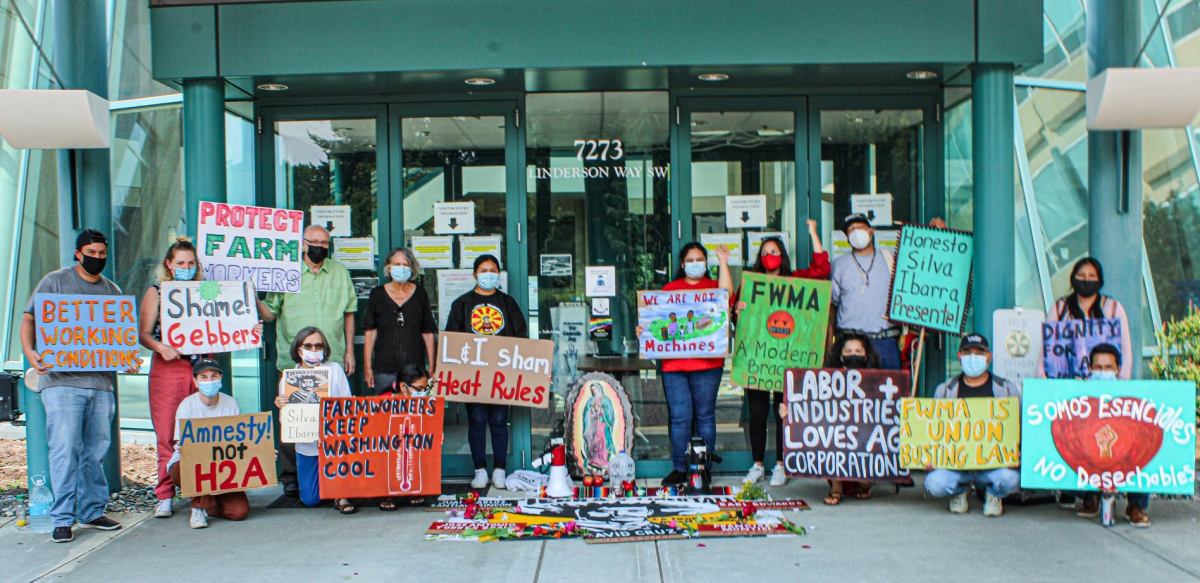Viewpoint: Citizenship, Not Surveillance, for Farmworkers

Familias Unidas por la Justicia is an independent union of indigenous farmworkers in Skagit and Whatcom Counties in Washington. In October 2022, their "Creando el mundo que queremos" tour visited seven towns to discuss the harmful Farm Workforce Modernization Act. Photo: Edgar Franks.
This week, I joined farmworkers across the country in sounding the alarm on legislation that would make us even more vulnerable. We have defeated it for now.
However, the agricultural lobby has been pushing for this legislation since 2019, and we know they will continue to propose legislation that ties immigration reform to labor exploitation.
I know just how grueling year-round agricultural work is and how difficult it can be to make ends meet as an undocumented farmworker. After coming to the United States from Oaxaca, Mexico, I spent years picking grapes and after that, working on dairy farms. Farm work wasn’t my first choice, but as an undocumented person, there weren’t any other options for me.
In just 10 years of farm work, my body was broken, leaving me unable to support myself. This is physically demanding work with long hours and little pay, but like so many immigrants, I was willing to do it to support my family in Mexico. When I left Oaxaca, it was a very difficult time. I had been in school, but my parents needed help. I decided to quit school and come to the U.S. so that my siblings could have the opportunity I could not have.
That’s why it’s upsetting that the U.S. Senate even considered Colorado Democratic Senator Michael Bennet’s version of the Farm Workforce Modernization Act. The big agriculture companies and some politicians said it would help undocumented farmworkers. In fact, bills like this do more harm than good. While the bill would technically create a path to citizenship for undocumented farmworkers, its real intent is to give our corporate bosses complete control over our lives.
TEN YEARS OF WORK
To start, the bill would only allow a farmworker to begin the path to citizenship after working in agriculture for up to 10 years. I can tell you from personal experience that’s far too long. What many Americans don’t understand when they drink a glass of milk is that dairy work is backbreaking. For six years, I woke up each morning at 3:30 a.m. Between myself and two co-workers, we would milk 1,700 cows in six hours, take a 15-minute lunch break, and then repeat the process for another six hours.
Long hours of repetitive motions—common in the industry—can damage the body in just a few years. I began to feel intense back pain. My feet, arms, and fingers were constantly sore. Even now, I still have side effects of carpal tunnel and other problems. Some nights I can’t sleep because of the pain. Under this law, farmworkers will have to decide between their own health and the slim chance to obtain legal status.
The bill would coerce workers to stay in dangerous jobs even if their bodies can no longer take it by preying on their hopes for citizenship and a healthy life. This will only mean more heartbreak for my community. For the few workers who have survived in this industry for decades, perhaps this bill could mean more stability for them. But we can do better.
BOSSES USE IMMIGRATION STATUS
Second, this legislation would have made E-Verify obligatory throughout agriculture. E-Verify is a voluntary web-based system that allows enrolled employers to confirm the eligibility of their employees to work in the United States. Currently no economic sectors are required by law to use E-Verify.
For undocumented workers, mandated E-Verify would mean an increased threat of intimidation on the job, where employers can use a worker’s legal status as leverage to demand even more work. And if employers are required to implement E-Verify, many workers will leave the industry out of fear, and be unable to support themselves.
The bill would also expand the flawed H-2A program that issues work permits for temporary guest work. H-2A workers are often even more vulnerable than undocumented workers. Even when I worked as an undocumented farmworker, I knew that if I got fired or if I was abused by an employer, I could at least try to look for another job. But under H-2A, guest workers have no other options because their legal status in the country is tied to their employer. If they are fired, they can be deported. Expanding the program without any significant oversight will make it more exploitive.
I can no longer work in agriculture. My body cannot take it anymore. But many of my friends and family members do, and I've heard from them how stressful it has been to deal with the pandemic on top of the exploitation we already face. Farmworkers have continued working through the pandemic with few health and safety protections and huge barriers to healthcare.
I urge all our legislators to find other ways to give farmworkers an easier or more immediate way to become residents, one that doesn’t give big agriculture more tools to exploit us. We deserve to be treated with respect as agricultural workers who expend great effort so that there is food in everyone's homes.
I hope that the future brings more collaboration between workers, because together we can make real change happen, and we can improve our working conditions.
Servando Jimenez is a former dairy worker and member of the Workers Center of Central New York.

SUPPORT LABOR NOTES
BECOME A MONTHLY DONOR
Give $10 a month or more and get our "Fight the Boss, Build the Union" T-shirt.





